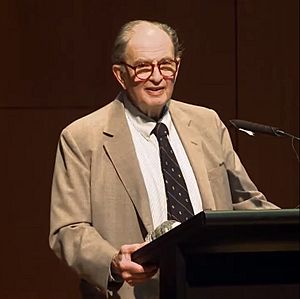Bernard Bailyn facts for kids
Quick facts for kids
Bernard Bailyn
|
|
|---|---|

Bailyn in 2012
|
|
| Born | September 9, 1922 Hartford, Connecticut, U.S.
|
| Died | August 7, 2020 (aged 97) Belmont, Massachusetts, U.S.
|
| Alma mater |
|
| Awards |
|
| Scientific career | |
| Fields | American history |
| Institutions | Harvard University |
| Doctoral students | Gordon S. Wood, Pauline Maier |
Bernard Bailyn (born September 10, 1922 – died August 7, 2020) was an important American historian. He wrote many books and taught at Harvard University starting in 1953.
Bailyn was an expert in the history of the United States during its colonial period and the American Revolution. He won the famous Pulitzer Prize for History two times, in 1968 and 1987. In 1998, he was chosen for the Jefferson Lecture, a high honor for people in the humanities. He also received the National Humanities Medal in 2010.
He studied many parts of early American history. This included looking at merchants (business people), how populations grew, and the Loyalists (people who stayed loyal to Britain). He also explored how ideas from Europe influenced America. He is especially known for his work on republicanism and Atlantic history. These studies changed how historians understood these topics.
Contents
Becoming a Historian
Bernard Bailyn was born in Hartford, Connecticut, in 1922. He went to Williams College and earned his bachelor's degree in 1945. Later, he got his Ph.D. (a high-level university degree) from Harvard University in 1953.
He stayed connected with Harvard for the rest of his life. He became a full professor in 1961. Even after he retired in 1993, he continued to be a professor emeritus. In 1979, he received an honorary doctorate from Grinnell College.
Important History Books
Bernard Bailyn wrote many influential history books. One of his most famous is The Ideological Origins of the American Revolution (1967). This book won the Pulitzer Prize for History in 1968.
He also edited other important works. These include The Apologia of Robert Keayne (1965) and the two-volume Debate on the Constitution (1993). He helped write The Great Republic (1977), which was a textbook about American history.
Key Ideas About History
Bailyn's early work focused on New England merchants. He showed that international trade was risky back then. To reduce these risks, merchants often worked together. They would marry into other merchant families and send trusted relatives to places like London. This helped them share information and resources.
He argued that this international trade helped colonial Massachusetts grow rich. But it also created tension with the traditional Puritan way of life. Bailyn believed that the world of merchants led to big social changes. It moved historians away from just studying Puritan religion.
Understanding the American Revolution
Bailyn is famous for his careful research. He often offered new ways to understand historical events. His most important work, The Ideological Origins of the American Revolution, is a great example.
In this book, Bailyn studied many pamphlets written before the American Revolution. He found that colonists truly believed the British government wanted to take away their rights. They thought Britain was trying to become a tyranny.
Bailyn argued that the colonists' talk about liberty and freedom was not just propaganda. It was central to how they understood their situation. This idea helped change an older theory by Charles A. Beard. Beard had suggested the Revolution was mainly about economic class differences. Bailyn showed that ideas and beliefs were very important to the revolutionaries. He called this the "transforming radicalism of the American Revolution."
Atlantic History
Bernard Bailyn was a strong supporter of Atlantic history. This field of study looks at the connections between Europe, Africa, and the Americas. It focuses on how people, ideas, and goods moved across the Atlantic Ocean.
From the mid-1980s, Bailyn led an international seminar on this topic. He encouraged studies about how people moved to colonial America. His book Atlantic History: Concepts and Contours (2005) explores this field. It highlights the diverse cultures and connections that traditional history often missed.
Family Life
Bernard Bailyn was married to Lotte Bailyn, who is a professor at MIT. They had two sons. Their son Charles Bailyn is an astrophysicist at Yale University. Their other son, John Bailyn, is a linguist at Stony Brook University.
Bernard Bailyn passed away on August 7, 2020, at his home in Belmont, Massachusetts. He was 97 years old.
His Students
Many of Bernard Bailyn's students became famous historians themselves. Some of them even won the Pulitzer Prize. These include Michael Kammen, Jack N. Rakove, and Gordon S. Wood. Pauline Maier was also a notable student.
His students went on to teach new generations of American historians. Some also explored other fields like law and the history of science.
See also
 In Spanish: Bernard Bailyn para niños
In Spanish: Bernard Bailyn para niños
 | Jessica Watkins |
 | Robert Henry Lawrence Jr. |
 | Mae Jemison |
 | Sian Proctor |
 | Guion Bluford |

